Author’s Note: This is not an academic or objective essay; rather a personalised opinion on the soon-to-be centenarian former secretary of state.
On one occasion, a joke was made on television about how Fidel Castro survived attempts to have him removed by US presidents as well as the downfall of USSR, who served as his main supporter. In 2023, a soon-to-be centenarian Dr. Henry Kissinger would be grinning and telling Castro’s soul to, as they say, “Hold his beer.” If the AI generator were asked to picturise “American foreign policy”, it would not be shocking if Henry Kissinger’s portrait or painting appeared.
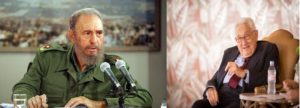
For decades, he was open and honest about his opinions on American foreign policy based on the pursuit of both national interest and power. In his own words: “A country that demands moral perfection of itself as a test of its foreign policy will achieve neither perfection nor security.” Kissinger has proven to be rich ground for historians and publishers. Along with business books about him as a deal-maker, there are also personality studies, tell-alls from former coworkers, and collections of his quotes.
Simultaneously, Kissinger had long been criticised by many as a ruthless realist. The critics would often quote Kissinger’s own words “when policy becomes excessively moralistic it may turn quixotic or dangerous”. Those words don’t seem all that offensive in retrospect after seeing so-called American moralist decisions made in places like Libya, Syria, Iraq, and Afghanistan. The critics would respond by citing Bangladesh and Chile as examples of how Kissinger was no better.
Weimar-Chile Connection
For the last few years, Kissinger seems to no longer arouse widespread contempt. Instead, some individuals have since expressed some sympathy for him, tying Kissinger’s ruthlessness to his status as a former resident of Weimar Germany. Born Heinz Kissinger on May 27, 1923, to an Orthodox Jewish school teacher in Fürth, Bavaria. In 1938, shortly before Kristallnacht, Kissinger and his family escaped to America, as did several German Jewish families.
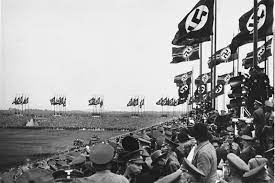
Jumping ahead in time, some authors frequently link this incident to his participation in the 1973 Chilean coup. Salvador Allende, a socialist, was elected president of Chile in 1970, but the US viewed him as a threat: Allende decided to introduce a “socialist humanist” curriculum for schools, nationalised some major corporations, imposed rules in support of ardent labour unionists, and even declared that they and Fidel Castro’s Cuba were “marching toward a common goal.” Point to note would be if this happened a decade after the Cuban Missile Crisis.
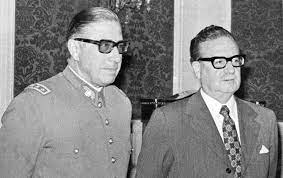
The reaction of the American establishment can be underscored by Kissinger saying “I don’t see why we have to stand by and watch a country go Communist because of the irresponsibility of its own people.” But it’s also possible to say that this statement comes from someone who witnessed the fall of the Weimar Republic and the rise of the Third Reich. The obvious criticism is that the pro-American dictator General Augusto Pinochet’s actions were more reminiscent of events in Germany during Kissinger’s childhood. However one can see in a twisted manner Kissinger’s view being of some worth as earlier this month the pro-Pinochet party came first in an election to choose 50 members of a committee that will rewrite Chile’s constitution.
Assimilated American
Rewinding back, it was not very long before Heinz revisited his country of birth. In 1945, while serving in the 84th Infantry Division, he took part in the liberation of the Ahlem concentration camp located outside of Hanover. For his assistance in dismantling a Gestapo sleeper cell, Kissinger was awarded the Bronze Star. He also seemed to have become culturally compatible with his Infantry Division, as evidenced by his fellow soldier’s statement, “He was more American than I’ve ever seen an American…”.
Kissinger enrolled at Harvard two years after this military feat and pieced together his own theory of statecraft there, while continuing to become increasingly culturally compatible with the then WASP American intellectual elites. For the majority of the country’s history, White Anglo-Saxon Protestants, or WASPs, have dominated American society, culture, and politics.
Later in 1954, Kissinger received a recommendation for a position at the Council on Foreign Relations, where he began overseeing a nuclear weapons study group. The result was seen in 1957, in the form of the book “Nuclear Weapons and Foreign Policy.” where Kissinger had written that ‘with a new generation of smaller, more transportable atomic weapons, a limited or little nuclear war was not as outlandish as it sounded.’ This ‘not as outlandish’ view was an alternative to the one advocated by John Foster Dulles, who served as secretary of state at the time. The latter advocated that ‘an aggressor state risked an atomic barrage’, in other words a very large nuclear war. During this time Kissinger captured the attention of American aspirants to political high-offices. Kissinger being culturally compatible with the American aristocracy resulted in him advising the top WASP leader of the Republican Eastern Establishment, former governor of New York Nelson Rockefeller in foreign policy.
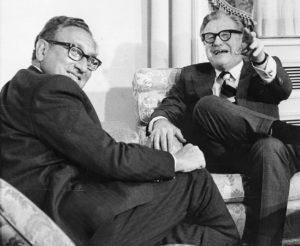
So it was surprising for many when Henry Kissinger went to work with Rockefeller’s rival Richard Nixon who won the 1968 United States presidential elections. For the boorish Nixon, Kissinger would have seemed out of place as the former was called unfit to rule by the latter. However, many observers pointed out that Nixon needed someone who would give his Presidency a touch of scholarly flair, and help him feel like a significant player in global politics, so the pairing was ideal. For his part, Kissinger once jokingly told an audience that the ideal way to work for a President is to support his opponent; sounds like a stereotypical American dealmaker, some would say.
Kissinger’s ‘not as outlandish’ view of ‘ a limited or little nuclear war’ has been one of the subjects discussed decades later, becoming one of the dreaded possibilities in case America gets directly involved in the ongoing Russia-Ukraine conflict. The aforementioned conflict has shown sharp divisions within the so-called international community, with one camp led by the US insisting the only way out is the decimation of Russia while other nations are in favour of negotiated peace. The pro-negotiation nations are mostly the ones belonging to the developing world. Kissinger at one point was in favour of negotiation though recently he had altered his views on the conflict. In this case it might be helpful just to look back at two instances of what Kissinger did in the 1970’s in context of two notable wars: the Yom-Kippur War and the Bangladesh Liberation War.
Scuttling Through Shuttling
The Egyptian and Syrian forces attacked the state of Israel unexpectedly on Yom Kippur, the Jewish holy day, on 6 October, 1973. Following the onset of hostilities, both the US and the USSR provided extensive resupply operations to their respective allies in the conflict. This war brought the superpowers almost into a direct conflict but as someone put it in a lame pun, Kissinger scuttled the conflict by engaging in “shuttle diplomacy,” a term created by the US media who followed Kissinger on his numerous brief flights between the capitals of the Middle East as he made an effort in laying the foundation for further measures to settle the conflict. Richard Nixon’s involvement in the negotiations was minimal because he was mired in the escalating Watergate scandal.
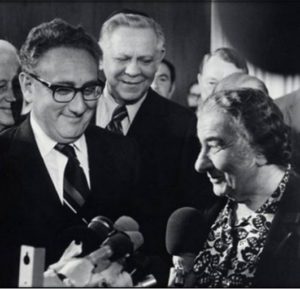
With Kissinger’s assistance, the first Egyptian-Israeli disengagement agreement was negotiated in January 1974, and in May, following a month of difficult negotiations, he organised the Syrian-Israeli disengagement. Kissinger’s shuttle diplomacy succeeded in concluding one last agreement in September 1975 with the signing of a second Egyptian-Israeli disengagement agreement. Following the conclusion of this Egyptian-Israeli disengagement agreement, commonly known as Sinai I, U.S. attention moved to Syria. Negotiations for a Syrian-Israeli disengagement proved to be much more difficult and time-consuming than those that resulted in the relatively quick agreement on the Egyptian-Israeli disengagement.
Learning from the Syrians, the Egyptians grew more difficult regarding negotiations with Israel for a second agreement which, unlike the previous one, lasted several months. In the end, Kissinger completed the Sinai II disengagement agreement, which was signed by both Egypt and Israel. Israeli forces were withdrawn from the Sinai further east as a result of this agreement. and a U.N. buffer zone was created. These agreements were precedents to the 1977 Camp David Agreement which established diplomatic relations between Egypt and Israel. Though many of Kissinger’s critics accused him of being a Zionist, his handling of the negotiations showed that the priority for the realist Henry was to maintain a ‘balance’ in the Middle East with both militarily powerful countries becoming reliable American allies.
Enabling Genocide?
Since the Russia-Ukraine conflict commenced in 2022, many of the Western nations who are loudly proclaiming support for Ukraine have been equally loud at lecturing the pro-negotiation nations of the developing world. Primarily many are quite moralist with regards to India, seen as a friendly nation to Russia. When the former was buying Russian crude oil at a discount price, there were many questioning the decision as very insensitive to which the Indian political establishment responded that the decisions were taken keeping Indian national interests in mind. Not satisfied, many political as well journalistic figures from the anti-negotiation Western nations even went as far to accuse India of having blood in her hands and making it possible for Russia to carry out a genocide in Ukraine. To this many in India would not hesitate to respond how Russia (as USSR) aided India in 1971 while the United States supported the genocidal acts of the Pakistani military in its Eastern Wing in what is Bangladesh today.
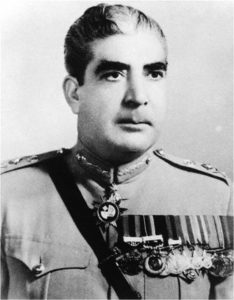
According to a number of scholars, one of the US officials responsible for enabling this genocide was then National Security Advisor Dr. Henry Kissinger. However, a sizable number of historical observers assert that General Agha Muhammad Yahya Khan, who was in power at the time, would not have listened to US criticism of the atrocities his army committed in Bangladesh. As per them:
U.S. military and economic aid to Pakistan in 1971 was not of a magnitude to provide Washington with much leverage to pressure the leadership in Rawalpindi to change policies in East Pakistan to avoid the loss of aid. . . . By 1971 Washington lacked much clout in Rawalpindi, particularly on issues that, in West Pakistani eyes, struck at the very basis of their national existence.
Point to note here would be that under Nixon and Kissinger, the United States was one of the leading donors to East Pakistan’s cyclone relief in 1970, along with providing emergency assistance to prevent a famine. Interestingly the mismanagement of cyclone relief was one of the reasons that angered East Pakistani residents against the Western wing and led to victory of the Awami League, and the consequent political complications that led to the infamous and bloody Operation Searchlight on 25 March, 1971 which made the Bangladesh liberation war inevitable.
Nixon and Kissinger repeatedly urged the Pakistani military at that time to scale back its domestic policies and look for political parity. In May 1971, Nixon wrote to Yahya Khan:
.. I feel sure you will agree with me that the first essential step is to bring an end to the civil strife and restore peaceful conditions in East Pakistan. . . . It is absolutely vital for the maintenance of peace in the Subcontinent to restore conditions in East Pakistan conducive to the return of refugees from Indian territory as quickly as possible.
The then-U.S. ambassador to Pakistan, Joseph Farland, would confirm Nixon’s concern mentioning that “without the creation of normal conditions in the East, a renewed sense of physical security among the Hindu community, and a patent movement with substance behind it toward a peaceful political accommodation . . . the refugee problem will continue.”
This war couldn’t have happened at a worse time as Pakistan was an important player in one of the most consequential decisions that the US took in order to get a step ahead in the Cold War race. During that time, Nixon and Kissinger sought to fundamentally alter the world order and power structure in the United States’ favour by opening up diplomatic channels with the People’s Republic of China. By striking a strategic deal with Beijing based on China’s genuine concern that the Soviet Union’s continued military build-up in the Far East might be the harbinger of an attack on China, the duo hoped to strengthen the position of America. It would also persuade Moscow to adopt more sensible policies toward the United States and ease tensions in Asia. This is underscored by Kissinger in White House Years: The hostility between China and the Soviet Union served our purposes best if we maintained closer relations with each side than they did with each other. The rest could be left to the dynamic of events.
It was in this aim that Pakistan came in as the nation most suitable to enable conversation between the US and China. Through the Pakistani channel, China gave its first direct indication that a personal envoy of Nixon would be welcomed in Beijing in December 1970, with Chinese premier Zhou Enlai insisting that Pakistan was a close ally of China. How would China have responded if the United States had told them that their decision to normalise relations was misguided as President Yahya Khan was an unsuitable representative of Washington? It can be safely assumed after the Vietnam imbroglio, Washington would be unwilling to even risk imagining such a scenario.
Thus Pakistan served as the secret tunnel for Uncle Sam to reach China. And this secret trip was taken by Henry Kissinger in July 1971. By this time the Liberation War was in full steam with millions of Bengalis fleeing to India (while a similar number was dying at the hands of a ruthless Pakistani army). Kissinger was aware of this tragedy and reprimanded Pakistan’s foreign secretary saying: 7 million refugees are an intolerable burden. They overload an already overburdened Indian economy, particularly in eastern India. The Indians see enormous danger of communal riots.
Unless Pakistan takes action to restore normalcy and ensure the return of refugees in peace, he warned, the likely outcome would be a conflict with India, which the latter could win. A point to remember here would be that at the time when Washington-to be crude-was checking out Beijing with Islamabad as the wingman, Moscow had already been on a few dates with New Delhi. So in case India engaged in conflict with Pakistan the USSR would be more likely to support the former. To add another point, last time India and Pakistan clashed in 1965 the Indian army had arrived in the area around Lahore and was thinking of launching an assault on the city before a ceasefire was announced.
If anyhow this war saw any scenario remotely close to 1965, the Indian subcontinent would have seen major disruptions which might have favoured India but would have increased problems for America. It is debatable whether India would have done any such disruption but one has to keep multiple scenarios in mind during a crisis, however implausible/impossible they are.
In this situation it would be instructive to quote scholar Gary Bass who is also a known Kissinger critic: Even if a president or prime minister has credible information about atrocities . . . there must still be a cold realpolitik calculation about the costs of intervening. . . . If a humanitarian intervention would lead to a broader international crisis, or plunge the country —or the world—into a massive war, then most cabinets will decide that it is just not worth it. . . . Believing in human rights does not make one suicidal.
One can argue that it was suicidal when Nixon deployed Task Force 74, led by the aircraft carrier USS Enterprise, into the Bay of Bengal to help the losing Pakistani side but was countered by the Soviet Navy. However in the context of not taking sides in the Bangladesh war, it would be correct to say while many countries expressed sympathy for the Bengali victims and refugees, with some providing relief assistance, the bulk of the international community were not willing to take active steps to put pressure the Pakistan government to halt their activities. The US establishment may be the main antagonist for the Indians and Bangladeshis but other leading nations were no saints. More importantly, the local collaborators of the Pakistan Army in their atrocities called Razakars were not prosecuted by the Bangladeshi authorities after the country gained independence. These collaborators functioned as citizens of the country and even were influential politically till the war crimes tribunal was established in 2009.
During the 1971 war, Kissinger was focussed on his goal to have another important Asian ally for America to counter the Soviets and he was willing to take risks to pursue that goal. And the criticism of Kissinger forgetting his childhood tragedy is not fully correct as the global powers of the 1920’s-30’s did not actively deter the excesses of Nazi Germany minus issuing condemnations and in some cases accepting refugees; it was only after Poland’s invasion did the same inactive nations become defenders of freedom against tyranny.
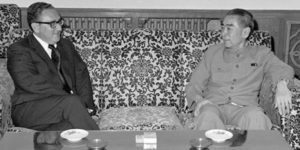
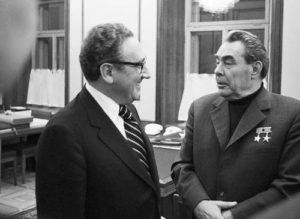
The aforementioned ‘cold realpolitik calculation’ of Kissinger led to Nixon’s highly successful trip to China in February 1972 and the signing of the Shanghai Communiqué, which set the foundation for bilateral relations between both nations along with increasing USA’s influence over Asia. As Kissinger had written, the ‘dynamic of events’ following Shanghai Communiqué played out in the form of the Nixon-Brezhnev summit on 25 May, 1972, in Moscow where the Anti-Ballistic Missile Treaty, the first Strategic Arms Limitation Treaty and the ‘U.S.-Soviet incidents-at-sea agreement’ were signed. The ‘Communiqué’ and the aforementioned agreements were notable achievements of a détente that decreased the likelihood of a conflict between superpowers. If one looks at the US-China-Russia tensions in recent times, it is easy to scoff at Kissinger but historical context would be kinder to him. During his tenure, Henry Kissinger hardly swayed from his goal of maintaining global power balance tilted in favour of the United States. The paraphrased extract from this review would be fitting:
..a friend of mine went to visit Kissinger….“ You know,” my friend said, “perhaps a more useful way to look at you is as a footballer.” “How so?” Henry wanted to know. “Well,” continued my friend, “in football, you have a clear goal…but the situation is very dynamic. And in heading towards that goal, you may pass, dribble, foul, get fouled, fall back, surge… But none of it changes the goal….
The essay has been published in the following blog as well.
well, jaishankar’s father subramaniam is supposed to have told kissinger, that as a former refugee himself, his position on bangladesh was wrong. kissinger was said to be very offended.
hope this is right.